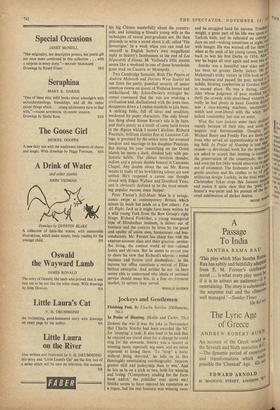Jockeys and Gentlemen
In Praise of Hunting. (Hollis and Carter, 25s.) DURING the war it was the joke in Newmarket that Charlie Smirke had been awarded the VC for 'stopping' a tank. It also used to be said that he enjoyed sea travel since for a change he could ring for the stewards. Smirke was a master at winning races, especially big ones, and no mean exponent at losing them. 'To "stop" a horse without being detected,' he tells us in this thoroughly entertaining autobiography, 'requires greater skill and jockeyship than to win.' And he lets us in on a trick or two, both for winning and losing. (`Compulsory reading for the form book addict,' the publisher may quote me.) Smirke seems to have enjoyed his reputation as a rogue, but his real business was winning races and he struggled hard for success. Trou weight, a great part of his life was spent io Turkish bath, and he subsisted on cabbage' days on end—waking sometimes at night, cf3:, with hunger. He was warned off for three }'; when at the peak of his young career, but foi , back to win his first Derby in 1934. Aiter, war he began all over again and won two rra Smirke was a beautiful race rider and Pi
fir
has been no greater Derby jockey. He gort Mahmoud's tricky victory in 1936 look an less business and passed the post, turned 10 saddle, blowing raspberries at Gordon Ric ,ct attf$C110 in second place. He
was a daring.
rider whose judgment of pace enabled bim thrill the crowds with short-head victories vi,k really he had plenty in hand. Gordon
!'
was a race-winning machine, unatt activ,A; watch and over-liberal with the whi,
P; Sta
lacked consistency but was an artist.
Asi$ Most flat race jockeys enter their prOf`'1,.; mainly because of their size, and some ne.;, s acquire real horsemanship. Dough Michael Beary and Freddy Fox are three eLn—t. tions who served an apprenticeship in the ing field. In Praise of Hunting is ju5t, tot sounds—a devotional work for the devoten:gto tisr,, are asked to accept that hunting is e!es a the preservation of the countryside, the 7rj and even the fox (who would otherwise be g out of existence). The foxhunter is sal('!t gentle creature and his clothes to be Of Ir. utilitarian design. Luckily, in the final essay anseY' t Christopher Sykes stops this fatuous n and makes it quite clear that the `Pink' i!t hunter's war-paint and his pursuit of the °-
cruel sublimation of darker desires. "
#1
cruel sublimation of darker desires. "
#1 PETER














































 Previous page
Previous page